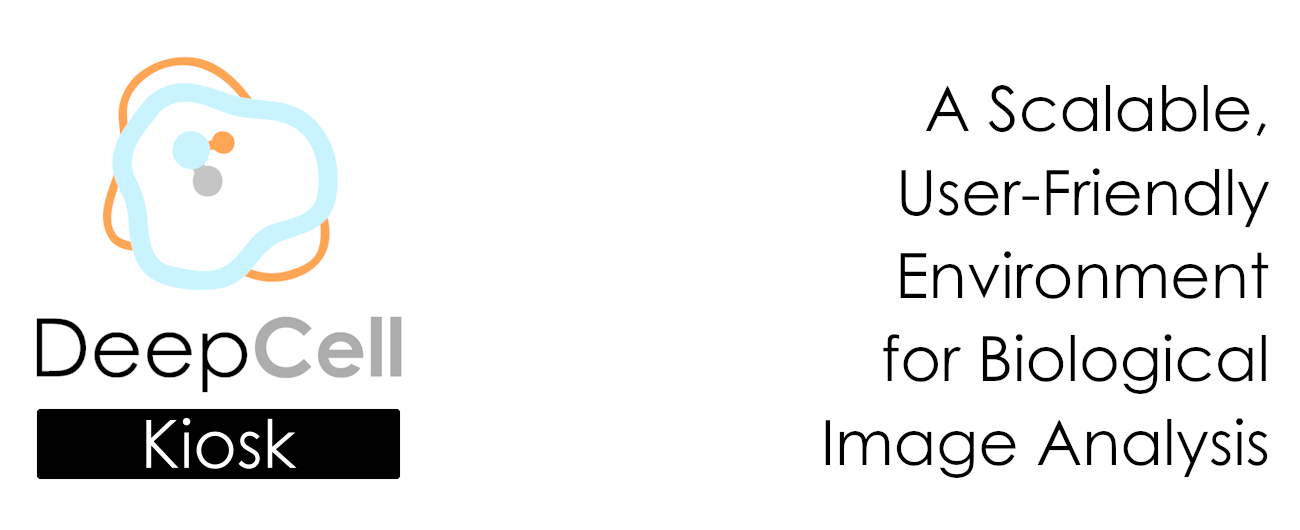The kiosk-redis-consumer reads events in Redis, downloads image data from the cloud, and sends the data to TensorFlow Serving via gRPC. The prediction is post-processed, zipped, and uploaded to the cloud.
This repository is part of the DeepCell Kiosk. More information about the Kiosk project is available through Read the Docs and our FAQ page.
Custom consumers can be used to implement custom model pipelines. This documentation is a continuation of a tutorial on building a custom job pipeline.
Consumers consume Redis events. Each type of Redis event is put into a queue (e.g. predict, track), and each queue has a specific consumer type will pop items off the queue.
Consumers call the _consume method to consume each item it finds in the queue.
This method must be implemented for every consumer.
The quickest way to get a custom consumer up and running is to:
- Add a new file for the consumer:
redis_consumer/consumers/my_new_consumer.py - Create a new class, inheriting from
TensorFlowServingConsumer(docs), which uses thepreprocess,predict, andpostprocessmethods to easily process data with the model. - Implement the
_consumemethod, which should download the data, run inference on the data, save and upload the results, and finish the job by updating the Redis fields. - Import the new consumer in redis_consumer/consumers/__init__.py and add it to the
CONSUMERSdictionary with a correponding queue type (queue_name). The script consume-redis-events.py will load the consumer class based on theCONSUMER_TYPE.
See below for a basic implementation of _consume() making use of the methods inherited from ImageFileConsumer:
def _consume(self, redis_hash):
# get all redis data for the given hash
hvals = self.redis.hgetall(redis_hash)
# only work on unfinished jobs
if hvals.get('status') in self.finished_statuses:
self.logger.warning('Found completed hash `%s` with status %s.',
redis_hash, hvals.get('status'))
return hvals.get('status')
# Load input image
fname = hvals.get('input_file_name')
image = self.download_image(fname)
# the model can be passed in as an environment variable,
# and parsed in settings.py.
model = 'NuclearSegmentation:1'
# Use a custom Application from deepcell.applications
app = self.get_grpc_app(model, deepcell.applications.NuclearSegmentation)
# Run the predictions on the image
results = app.predict(image)
# save the results as an image file and upload it to the bucket
save_name = hvals.get('original_name', fname)
dest, output_url = self.save_output(image, redis_hash, save_name)
# save the results to the redis hash
self.update_key(redis_hash, {
'status': self.final_status,
'output_url': output_url,
'upload_time': timeit.default_timer() - _,
'output_file_name': dest,
'total_jobs': 1,
'total_time': timeit.default_timer() - start,
'finished_at': self.get_current_timestamp()
})
# return the final status
return self.final_statusFor guidance on how to complete the deployment of a custom consumer, please return to Tutorial: Custom Job.
The consumer is configured using environment variables. Please find a table of all environment variables and their descriptions below.
| Name | Description | Default Value |
|---|---|---|
QUEUE |
REQUIRED: The Redis job queue to check for items to consume. | "predict" |
CONSUMER_TYPE |
REQUIRED: The type of consumer to run, used in consume-redis-events.py. |
"image" |
STORAGE_BUCKET |
REQUIRED: The name of the storage bucket used to download and upload files. | "s3://default-bucket" |
INTERVAL |
How frequently the consumer checks the Redis queue for items, in seconds. | 5 |
REDIS_HOST |
The IP address or hostname of Redis. | "redis-master" |
REDIS_PORT |
The port used to connect to Redis. | 6379 |
REDIS_TIMEOUT |
Timeout for each Redis request, in seconds. | 3 |
EMPTY_QUEUE_TIMEOUT |
Time to wait after finding an empty queue, in seconds. | 5 |
DO_NOTHING_TIMEOUT |
Time to wait after finding an item that requires no work, in seconds. | 0.5 |
STORAGE_MAX_BACKOFF |
Maximum time to wait before retrying a Storage request | 60 |
EXPIRE_TIME |
Expire Redis items this many seconds after completion. | 3600 |
METADATA_EXPIRE_TIME |
Expire cached model metadata after this many seconds. | 30 |
TF_HOST |
The IP address or hostname of TensorFlow Serving. | "tf-serving" |
TF_PORT |
The port used to connect to TensorFlow Serving. | 8500 |
GRPC_TIMEOUT |
Timeout for gRPC API requests, in seconds. | 30 |
GRPC_BACKOFF |
Time to wait before retrying a gRPC API request. | 3 |
MAX_RETRY |
Maximum number of retries for a failed TensorFlow Serving request. | 5 |
We welcome contributions to the kiosk-console and its associated projects. If you are interested, please refer to our Developer Documentation, Code of Conduct and Contributing Guidelines.
This software is license under a modified Apache-2.0 license. See LICENSE for full details.
Copyright © 2018-2022 The Van Valen Lab at the California Institute of Technology (Caltech), with support from the Paul Allen Family Foundation, Google, & National Institutes of Health (NIH) under Grant U24CA224309-01. All rights reserved.

